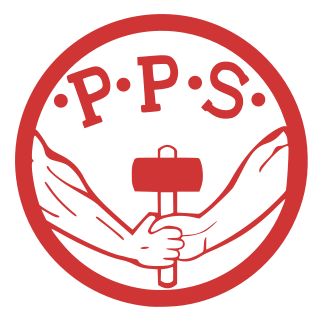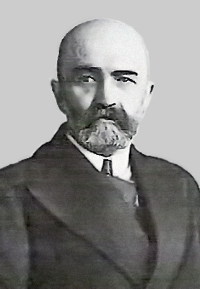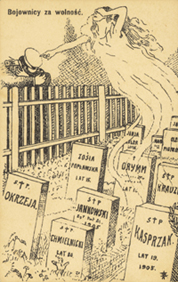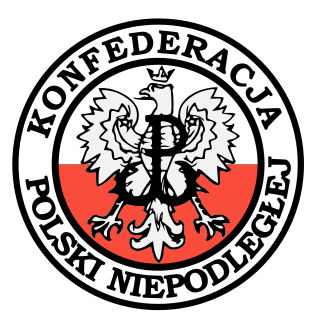
Stanisław Wojciechowski was a Polish politician and scholar who served as President of Poland between 1922 and 1926, during the Second Polish Republic.

Józef Klemens Piłsudski[a] was a Polish statesman who served as the Chief of State (1918–1922) and first Marshal of Poland. In the aftermath of World War I, he became an increasingly dominant figure in Polish politics and exerted significant influence on shaping the country's foreign policy. Piłsudski is viewed as a father of the Second Polish Republic, which was re-established in 1918, 123 years after the final partition of Poland in 1795, and was considered de facto leader (1926–1935) of the Second Republic as the Minister of Military Affairs.
Totalitarian democracy is a term popularized by Israeli historian Jacob Leib Talmon to refer to a system of government in which lawfully elected representatives maintain a nation state whose citizens, while granted the right to vote, have little or no participation in the decision-making process of the government. This idea that there is one true way for a society to be organized and a government should get there at all costs stands in contrast to liberal democracy which trusts the process of democracy to, through trial and error, help a society improve without there being only one correct way to self-govern. Totalitarian democracy is equivalent to electoral autocracy.
Sanation was a Polish political movement that was created in the interwar period, prior to Józef Piłsudski's May 1926 Coup d'État, and came to power in the wake of that coup. In 1928 its political activists would go on to form the Nonpartisan Bloc for Cooperation with the Government (BBWR).

Roman Stanisław Dmowski was a Polish politician, statesman, and co-founder and chief ideologue of the National Democracy political movement. He saw the Germanization of Polish territories controlled by the German Empire as the major threat to Polish culture and therefore advocated a degree of accommodation with another power that had partitioned Poland, the Russian Empire. He favoured the re-establishment of Polish independence by nonviolent means and supported policies favourable to the Polish middle class. While in Paris during World War I, he was a prominent spokesman for Polish aspirations to the Allies through his Polish National Committee. He was an instrumental figure in the postwar restoration of Poland's independent existence. Throughout most of his life, he was the chief ideological opponent of the Polish military and political leader Józef Piłsudski and of the latter's vision of Poland as a multinational federation against German and Russian imperialism.
National Democracy was a Polish political movement active from the second half of the 19th century under the foreign partitions of the country until the end of the Second Polish Republic. It ceased to exist after the German–Soviet invasion of Poland of 1939.

Wincenty Witos was a Polish statesman, prominent member and leader of the Polish People's Party (PSL), who served three times as the Prime Minister of Poland in the 1920s.
The Nonpartisan Bloc for Cooperation with the Government was a "non-political" organization in the interwar Second Polish Republic, in 1928–35. It was closely affiliated with Józef Piłsudski and his Sanation movement. Its major activists included Walery Sławek, Kazimierz Bartel, Kazimierz Świtalski, Aleksander Prystor, Józef Beck, Janusz Jędrzejewicz, Wacław Jędrzejewicz, Adam Koc, Leon Kozłowski, Ignacy Matuszewski, Bogusław Miedziński, Bronisław Pieracki, Adam Skwarczyński, and Janusz Franciszek Radziwiłł.

The Polish Socialist Party is a socialist political party in Poland.
Sheldon Sanford Wolin was an American political theorist and writer on contemporary politics. A political theorist for fifty years, Wolin became Professor of Politics, Emeritus, at Princeton University, where he taught from 1973 to 1987.

Robert Leszek Moczulski is a Polish historian and politician, a member of various organizations, first supporting then supposedly opposing the communist regime in the People's Republic of Poland while dividing the opposition movement.

Parliamentary elections were held in Poland on 16 November 1930, with Senate elections held a week later on 23 November. In what became known as the Brest elections, the pro-Sanation Nonpartisan Bloc for Cooperation with the Government took 47% of the vote and 249 of the 444 seats in Sejm and 77 of the 111 seats in the Senate. The elections are known as the least free elections in the Second Polish Republic due to the Brest trial controversy.
A Piłsudskiite was a political supporter of Marshal Józef Piłsudski, the founder of the First World War Polish Legions and the first Chief of State of the Second Republic of Poland. The Piłsudskiites had a major influence on the politics of Poland during the interwar period (1918–1939).

The Combat Organization of the Polish Socialist Party was an illegal Polish guerrilla organization founded in 1904 by Józef Piłsudski.

Confederation of Independent Poland was a Polish nationalist political party founded on 1 September 1979 by Leszek Moczulski and others declaring support for the pre-war traditions of Sanacja and Józef Piłsudski.

Związek Ludowo-Narodowy was a Polish political party aligned with the National Democracy political movement during the Second Polish Republic, gathering together right-wing politicians with conservative and nationalist opinions.

Gabriel Czechowicz (1876-1938) was a Polish lawyer, economist and politician. He was the Polish Treasury Minister from 1926 to 1929. Accused of misuse of government funds, Czechowicz was the only Polish politician of the interwar period that faced the State Tribunal of the Republic of Poland in the so-called Czechowicz Case. The case was dropped without ruling due to pressure from the Sanacja regime.

Brigadier General Bolesław Jerzy Roja was an officer of the Polish Legions in World War I, a general, and a politician in the Second Polish Republic, recipient of some of the highest Polish military awards including Virtuti Militari. He opposed Józef Piłsudski and his Sanacja regime in the 1920s. After the German invasion of Poland in 1939 he was arrested and murdered by the Nazis in Sachsenhausen concentration camp.
Piłsudski's colonels, or the colonels' regime, dominated the government of the Second Polish Republic from 1926 to 1939. In some contexts, the term refers primarily to the final period (1935–1939), which followed the death of their mentor and patron, Józef Piłsudski.
Inverted totalitarianism is a system where economic powers like corporations exert subtle but substantial power over a system that superficially seems democratic. Over time, this theory predicts a sense of powerlessness and political apathy, continuing a slide away from political egalitarianism.











